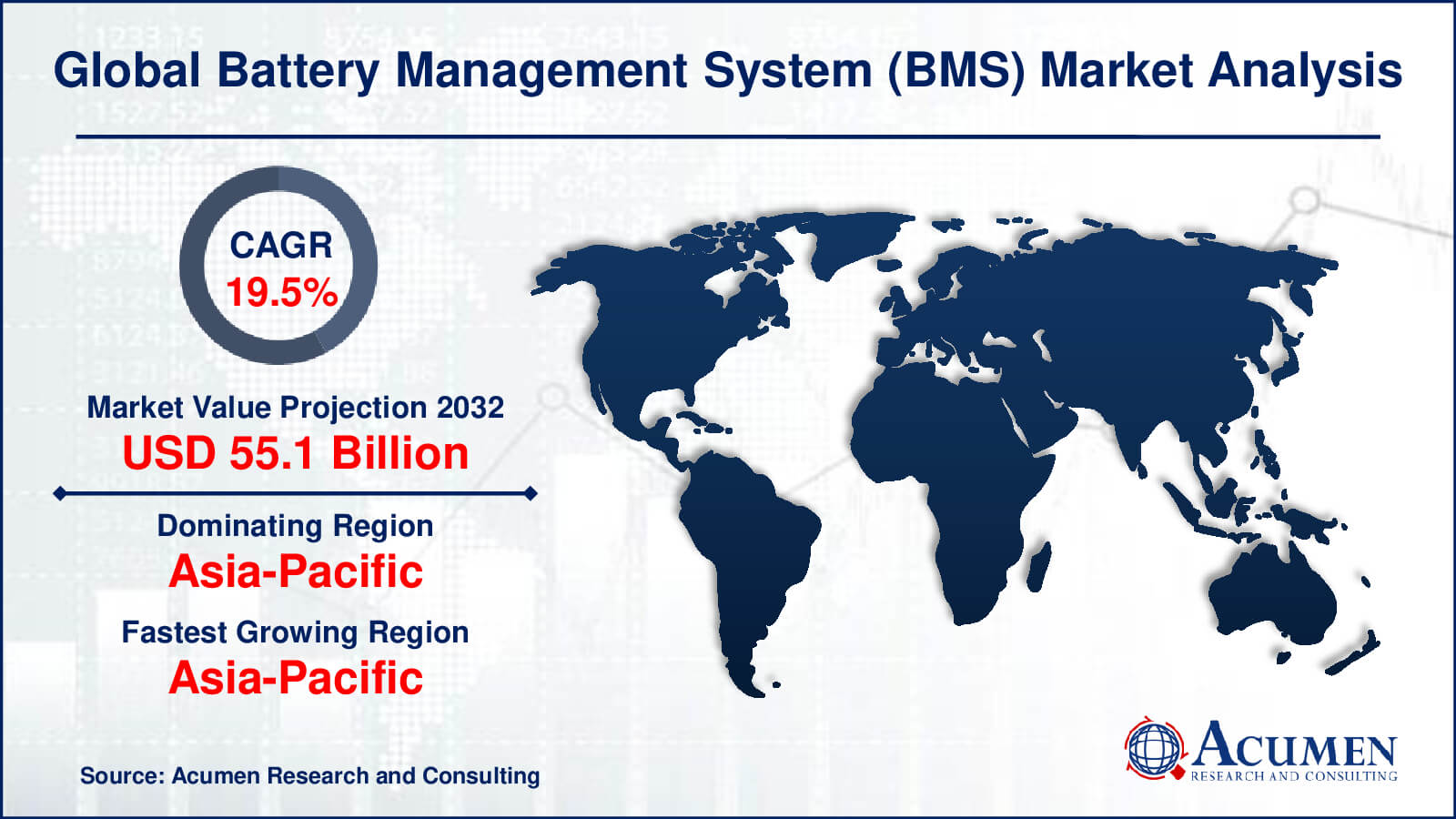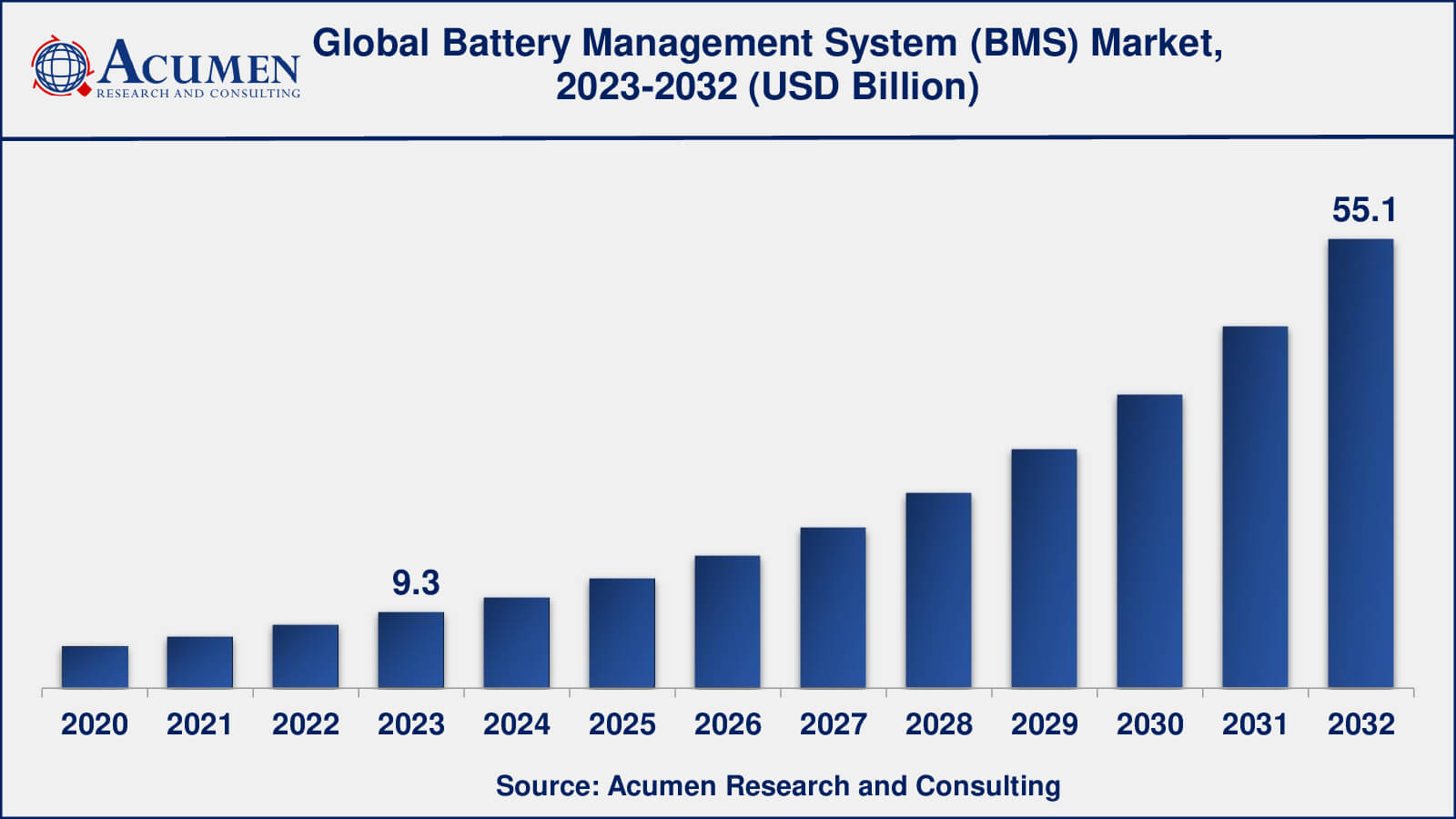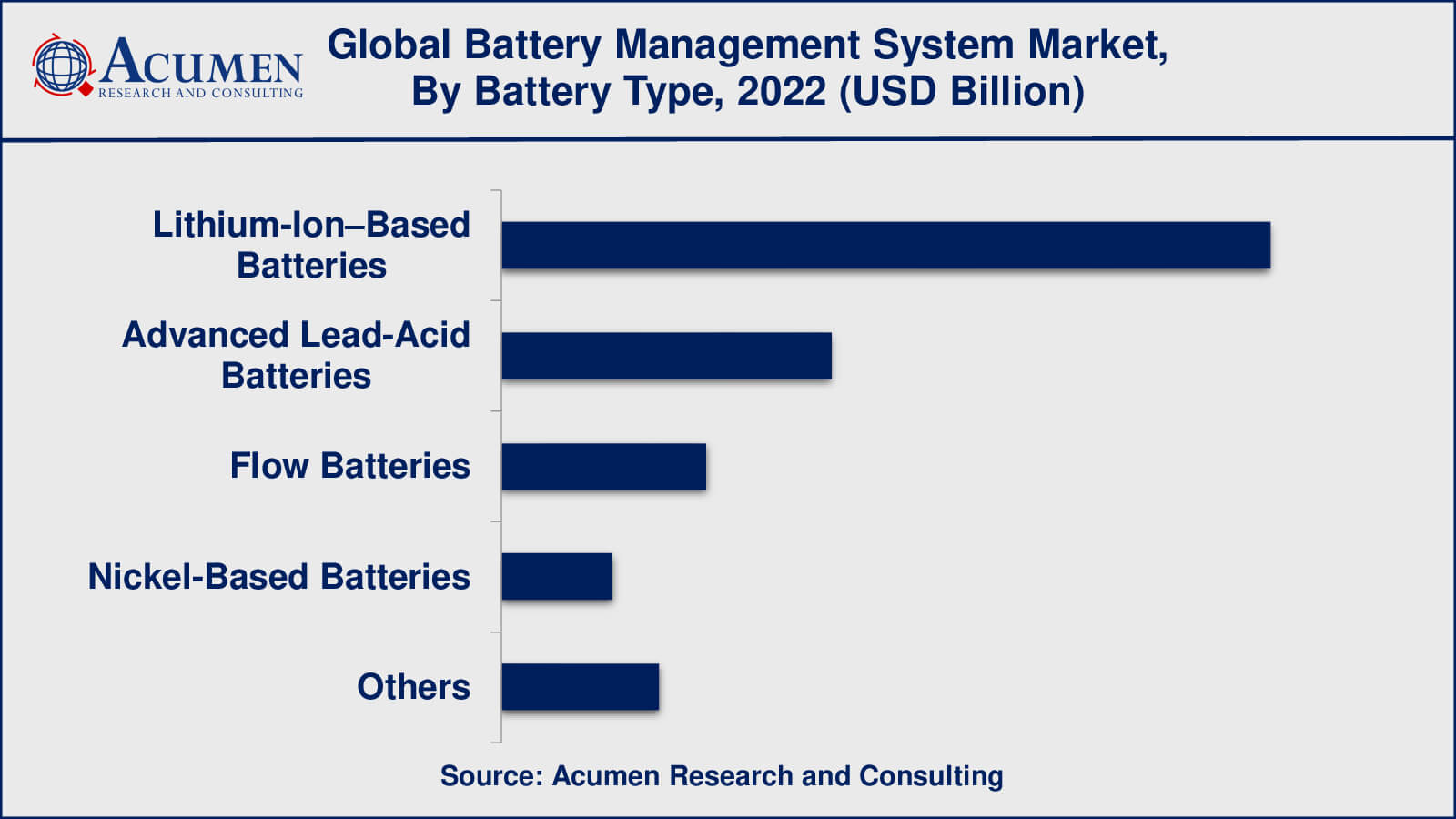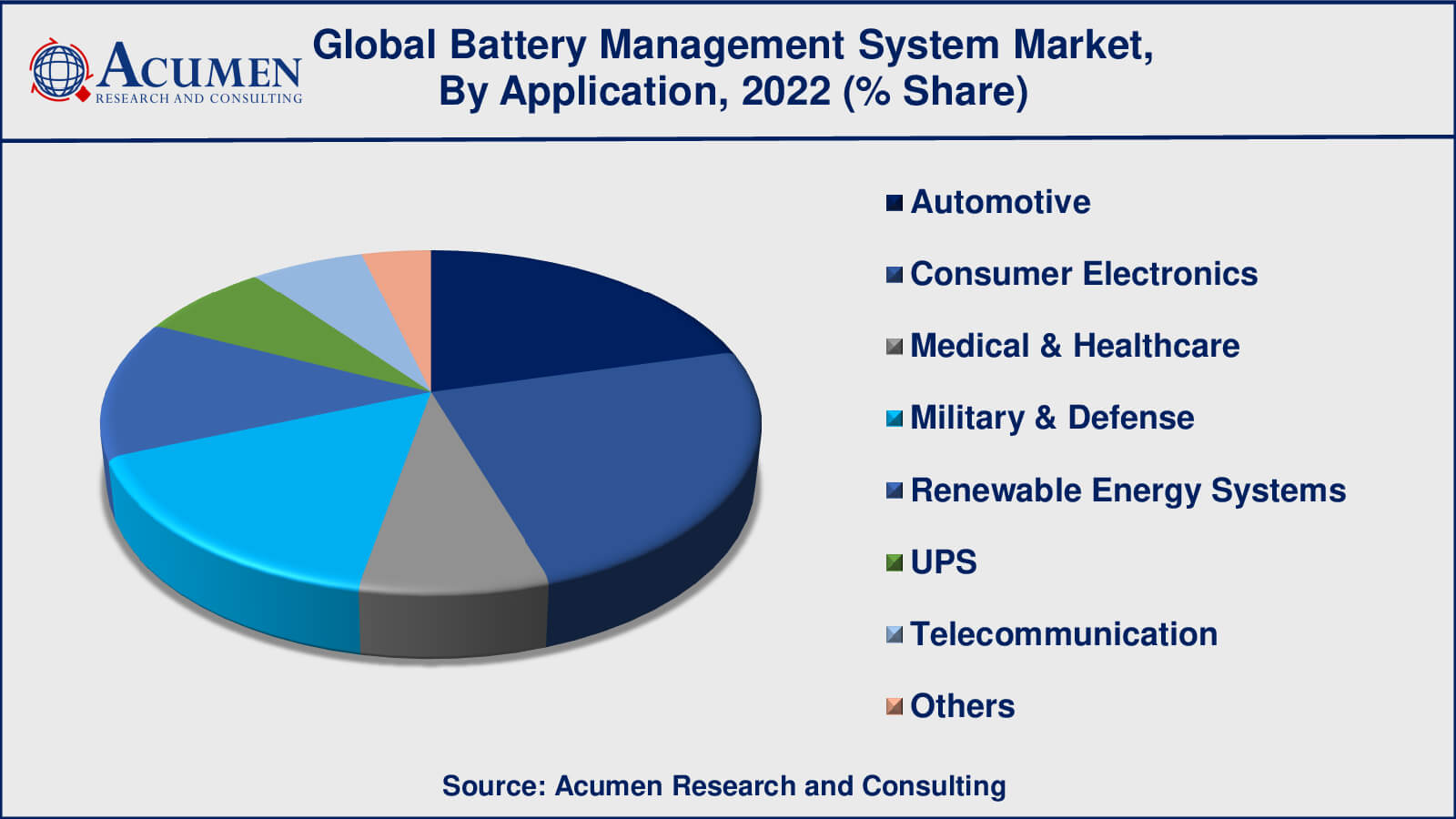November 2024
Battery Management System Market Size collected USD 7.8 Billion in 2022 and is set to achieve a market size of USD 55.1 Billion in 2032 growing at a CAGR of 19.5% from 2023 to 2032.
The Global Battery Management System Market Size collected USD 7.8 Billion in 2022 and is set to achieve a market size of USD 55.1 Billion in 2032 growing at a CAGR of 19.5% from 2023 to 2032.
A battery management system (BMS) also abbreviated as BMS is an electronic framework that deals with the involvement of rechargeable batteries. The most crucial function which a battery management system performs is a defense of a cell and hence it enables and ensures a long life of the battery. To warranty that the charge of a battery does not exceed beyond or under the battery’s limit, a battery management system has a self-defending unit, also known as a lithium-ion protector. The lithium-ion protector helps in the protection of cells from getting damaged. In any case, if the lithium-ion battery cells get overcharged due to some reason, those batteries may get defective or damaged owing to excessive heating. Hence, it is very important to install a battery management system to protect against serious problems like overvoltage. In addition, a battery management system helps in providing the management of energy. A battery management system is used for various applications such as the handheld point of sale, also abbreviated as POS terminals. These handheld POS employ a battery-implanted charger which comprises an inductor, a control device, and a discharger.

Battery Management System Market Report Statistics

Global Battery Management System (BMS) Market Dynamics
Market Drivers
Market Restraints
Market Opportunities
Battery Management System Market Report Coverage
| Market | Battery Management System Market |
| Battery Management System Market Size 2022 | USD 18.5 Billion |
| Battery Management System Market Forecast 2032 | USD 55.1 Billion |
| Battery Management System Market CAGR During 2023 - 2032 | 19.5 % |
| Battery Management System Market Analysis Period | 2020 - 2032 |
| Battery Management System Market Base Year | 2022 |
| Battery Management System Market Forecast Data | 2023 - 2032 |
| Segments Covered | By Type, By Battery Type, By Topology, By Application, And By Geography |
| Regional Scope | North America, Europe, Asia Pacific, Latin America, and Middle East & Africa |
| Key Companies Profiled | Nuvation, Ventec S.A.S., TWS, Ashwoods Energy Limited, Vecture Inc., Lithium Balance, Larsen & Toubro Limited, Toshiba America, Inc., AVL, Merlin Equipment Ltd., Navitas System and Johnson Matthey. |
| Report Coverage |
Market Trends, Drivers, Restraints, Competitive Analysis, Player Profiling, Covid-19 Analysis, Regulation Analysis |
Battery Management System BMS Market Growth Factors
Some of the key factors which are anticipated to fuel the growth of global battery management systems market include rising innovations in the automotive segment, viz. e-vehicles or electronic vehicles. The electronic vehicles have been witnessing increasing demand across the globe over the recent years. Moreover, automotive manufacturers are focusing on investing heavily in electronic vehicle solutions. Thus, increasing investments in electronic vehicles across the globe is a key factor fueling the growth of global battery management systems market.
Battery Management System Systems Market Segmentation
The worldwide battery management system BMS market is categorized based on type, battery type, topology, application, and geography.
Battery Management System Market By Type
The stationary battery sub-segment accounted for the majority of the share in 2021, according to the battery management system industry analysis. The stationary battery segment dominated the market for battery management systems (BMS). The increasing demand for energy storage systems, particularly renewable energy storage, can be attributed to the growth of the stationary battery segment. The growing demand for energy storage systems is being driven by the need for stable and reliable power supply, particularly in remote areas with limited grid access. BMS is an important component of these energy storage systems because it optimizes battery performance and extends battery life. On the other hand, the motive battery segment is expanding as a result of rising demand for electric vehicles (EVs). BMS is an important component of EVs because it optimizes battery performance and extends battery life. The growing popularity of EVs is expected to increase demand for motive battery BMS in the coming years.
Battery Management System Market By Battery Type

According to the battery management system market forecast, lithium-ion batteries will dominate the market for battery management systems (BMS). Consumer electronics, electric vehicles (EVs), and renewable energy storage systems all use lithium-ion batteries. The lithium-ion battery segment's growth can be attributed to the batteries' high energy density and long cycle life, which make them an appealing option for a wide range of applications. Lead-acid batteries are also commonly used in the BMS market, especially for applications requiring a low-cost energy storage solution. Lead-acid batteries are commonly used in backup power and uninterruptible power supply (UPS) systems. Nickel-cadmium (NiCad) and nickel-metal Hydride (NiMH) batteries are also used in the BMS market, but to a lesser extent than lithium-ion and lead-acid batteries.
Battery Management System Market By Topology
The centralized topology dominated the market for battery management systems (BMS). A single BMS unit manages multiple batteries in a system using the centralized topology. This topology is frequently used in large-scale energy storage systems, such as those used for renewable energy storage and EV charging. For these applications, the centralized topology is preferred because it provides a single point of control for managing multiple batteries, simplifying system design and lowering costs. The distributed topology, in which each battery has its own BMS unit, is also used in some applications, most notably small-scale energy storage systems and electric vehicles (EVs). The modular topology employs multiple BMS units that can be linked together to form a larger system.
Battery Management System Market By Application

The market for battery management systems (BMS) was dominated by the renewable energy systems segment. The increasing demand for energy storage systems, particularly renewable energy storage, can be attributed to the growth of the renewable energy systems segment. BMS is an important component of these energy storage systems because it optimizes battery performance and extends battery life. The growing popularity of renewable energy sources is expected to increase demand for BMS in renewable energy systems in the coming years. The automotive segment is also expanding, owing to rising demand for electric vehicles (EVs). The consumer electronics segment is also expanding, owing to rising demand for portable electronics.
Battery Management System Market Regional Outlook
North America
Europe
Asia-Pacific
Latin America
The Middle East & Africa
Battery Management System BMS Market Regional Analysis
The healthy demand in Asia-Pacific is expected to be the key driving factor for the growth of the global battery management system market. China is anticipated to lead the market, accounting for the largest share of battery management systems in Asia-Pacific. The significant growth in industrial production over the last few years in China is expected to be the prime factor behind the growth of the battery management systems market in the region. The markets in other developing countries such as Brazil, Russia, Poland, Indonesia, New Zealand, Argentina, and India among others are also anticipated to grow rapidly throughout the forecast period.
Battery Management System Market Players
Some of the leading battery management system companies include Nuvation, Ventec S.A.S., TWS, Ashwoods Energy Limited, Vecture Inc., Lithium Balance, Larsen & Toubro Limited, Toshiba America, Inc., AVL, Merlin Equipment Ltd., Navitas System, and Johnson Matthey.
Looking for discounts, bulk pricing, or custom solutions? Contact us today at sales@acumenresearchandconsulting.com
November 2024
March 2023
October 2023
September 2024